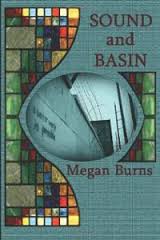Laura Madeline Wiseman: In her NPR interview with Terry Gross in October 2011, Marie Howe talks about mystery and the unsayable in poetry. In talking about one her poems, she says, “I think I was trying to tell a narrative or trying to tell a story or trying to explain something. I don’t know. I couldn’t, you know, every poem holds the unspeakable inside it, the unsayable, you know, not unspeakable as in taboo but the unsayable, the thing that you can’t really say because it’s too complicated, it’s too complex for us.” Can you talk about mystery and the unsayble in your new book the Sound and Basin?
Megan Burns: Laura, I like this idea of the “unsayable” rather than language being unable to hold what we need it to; it transfers the onus onto our ability to give space to what the poem can do. And sometimes, we as the poet, need to invest a bit of trust into the poem’s ability to be a placeholder for these events that seem to evade a simple telling. My first book, Memorial + Sight Lines, dealt with post-Katrina New Orleans, and I struggled a lot with being able to find the right “words” to capture that experience. So much new language emerges from these traumatic events, and in Sound and Basin, this struggle continues as I try to bear witness to the ongoing destruction caused by the Deepwater Horizon disaster. My third child was born months before the explosion and I watched the Gulf being flooded with oil as I would breastfeed her, so the experience of this destruction of life and the preciousness of life is deeply intertwined in this collection. It’s strange to qualify disaster, but the Deepwater Horizon event felt to me so much more perilous than Katrina, because if we destroy our waters with such careless negligence than there really is not much hope for a future planet for in which my children can live. Continue reading
![[PANK]](https://pankmagazine.com/wp-content/themes/pank/assets/images/pank-logo-large.png)
